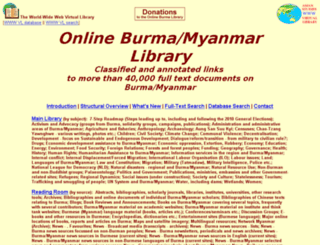Focal point
Location
The Online Burma/Myanmar Library (OBL) is a non-profit online research library mainly in English and Burmese serving academics, activists, diplomats, NGOs, CSOs, CBOs and other Burmese and international actors. It is also, of course, open to the general public. Though we provide lists of Burma/Myanmar news sources, the Library’s main content is not news but in-depth articles, reports, laws, videos and links to other websites, We provide a search engine (database and full text) and an alphabetical list of categories and sub-categories, but the Library is best accessed through browsing the 100 or so categories which lead to sub- and sub-sub categories. These tools should be used in combination.
Members:
Resources
Displaying 221 - 225 of 1151The Foreign Presence in Mandalay during the Konbaung Period: A Review of the Urban Area
Mandalay has many faces. As the last capital of the Konbaung Dynasty, Mandalay is
considered the origin of the traditional Myanmar culture. A wide variety of handicrafts
remain in practice today and are a focal point of the Buddhist practice. However, Mandalay
cannot be discussed in only the narrow framework of Myanmar culture. Mosques, Hindu
temples, and Chinese temples stood in a row along its streets, demonstrating the complex
history of this city.
However, the study of Mandalay’s diversity remains limited. The urban area of
Transnational “Myanmar”-Karenni Societies in United States: Experiences of Karenni Refugee Resettlement
This paper examines the resettlement of refugees from Burma/Myanmar to the United
States, by focusing on the refugee experience. The ethnographic description of the
resettlement process reveals how refugees, by establishing a transnational “Myanmar”
community in the United States, manifested a nationalism that was hitherto believed to be
impossible.
Building a nation-state in Burma/Myanmar has been a controversial issue since the
nation’s independence from the British in 1948. Callahan argues that the process of state
Toungoo Situation Update: Thandaunggyi Township, April to June 2014
This Situation Update describes events occurring in Thandaunggyi Township, Toungoo District during the period between April and June 2014, including land confiscation and access to education, healthcare and livelihoods: The Burma/Myanmar government provided 1,000 kyat (US $0.97) in A--- village for each student; however the teacher did not pay out the money to the students, saying that she had paid out the money for the cost of transporting school books...There are some mid-wives and medics provided by the Burma/Myanmar government who visit villagers in Maung Nwe Gyi village tract, Kon Tain
ADDRESSING THE HUMAN RIGHTS IMPACTS OF ‘LAND GRABBING’
This Study discusses the human rights issues raised by large-scale land deals for plantation agriculture (‘land grabbing’) in low and middle-income countries. Firstly, the Study takes stock of available data on large land deals, their features and their driving forces. It finds that ‘land grabbing’ is a serious issue requiring urgent attention. Secondly, the Study conceptualises the link between land deals and human rights, reviews relevant international human rights law and discusses evidence on actual and potential human rights impacts.
Where is genuine peace? - A critique of the peace process in Karenni State
A new report by the Karenni Civil Society Network (KCSN) raises concerns about
international “peace support” programming amid
st increasing Burma Army militarization in
Karenni State after the2012 ceasefire with the
Karenni National Progressive Party (KNPP).
The report “Where is Genuine Peace?” exposes how a pilot resettlement project of the
Norway-led Myanmar Peace Support Initiative (MPSI) in Shardaw
Township is encouraging
IDPs to return to an area controlled by the Burma Army where their safety cannot be
guaranteed.


